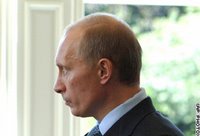
Something made me cringe when I first learned that Stephen Harper had declared Canada a future "energy superpower." I guess it was the superpower thing and everything in connotes.
What is a superpower? It's been defined as, "one of a very small number of nations that dominate the world and compete with each other for economic or political control of blocs of less powerful nations." Just what other superpowers does Harper want to compete with and, better yet, which lesser nations does he seek to control?
Maybe Stevie was just playing braggadocio, but maybe not. It's a term he's fond of using, even today. So maybe it's useful to see what an "energy superpower" might look like, given that we already have one model, Russia.
In the latest New Yorker, Michael Specter writes about the strange fate that seems to befall Vladimir Putin's critics. In the course of the article, Specter provides a window into Russia's new superpower weapon - not tanks but energy.
Today's Russia has come a long way under Putin. At a press conference in Germany he spelled it out: "When I became President, our foreign-currency and gold reserves stood at twelve billion dollars, and now they have increased by eighty billion over the first half of this year alone, and currrently come to a total of around two hundred and seventy billion. We have paid off our debts in full. We have now become a grain exporting country."
Putin has parlayed this newfound wealth to achieve a consolidation of powers at home and to impose the velvet fist of Russia's influence abroad.
Within Russia the people have traded their freedom for prosperity. Alexei Volin served three years as Putin's deputy chief of staff and says the Russian people are happy - and indifferent. "Several months ago, I talked to one important Kremlin person and I asked him why is our TV news so awful and dull. And his answer was 'Why are you watching TV? People like you shold go read the Internet if you want information. TV is not for you. It's for the people.'"
Aleksei Venediktov runs Moscow radio station Echo. He told Specter that, increasingly, freeedom of the press doesn't matter much and is disappearing, "Here we have this question of freedom or wealth. People chose wealth. They do not understand that freedom is a necessary condition for preserving that weealth and the security they have come to value. To be engaged in honest reporting about delicate subjects like corruption or to travel to Chechnya is too dangerous. People don't want it, they don't ask for it, and they really don't understand that they need it."
Putin has effectively seized control of Russia's mass-media, particularly television and radio. The broadcasters have been put in the hands of reliable companies such as Gazprom. Anna Kachkaeva, who broadcasts a weekly interview show on Radio Liberty, told Specter that reporters have learned to watch what they say,"It's a magic process now. There is no censorship - it's much more advanced. I would call it a system of contacts and agreements between the Kremlin and the heads of television networks. ...the problem, for TV and even in the printed press, is that self-censorship is worse than any other kind. Journalists know - they can feel - what is allowed and what is not."
With a population anaesthetized by the whiff of prosperity and a media cowed and willing to do his bidding, Putin has consolidated his powers within the energy superpower and used it's strength to impose his will abroad.
On New Year's Day, 2006, Russia abruptly cut gas exports to the Ukraine in response to objections about a sharp increase in prices. More recently, Belarus got the same treatment when Russia doubled its gas price and levied heavy export duties. Specter concludes, "Putin clearly sees today's ideological battles in economic, rather than military terms."
Fyodor Lukyanovk, editor of the journal Russia in Global Affairs, summed it up, "The entire world is obsessed with energy security and resources. You need it. We have it. It is up to us to decide how to deal with that. India and China are seeking new sources of energy to secure their very rapid growth. The U.S. is lost in its war in Iraq, the European Union has no idea what it is anymore. And then there is Russia: stable, wealthy, controlled very solidly. No opposition. There is really a feeling of superiority, a sense that Russia is now an indispensable nation, as Mrs. Albright said just a few years ago about the United States."
So, that's a glimpse at what becoming an energy superpower can mean. It still doesn't answer the question of what it means to Stephen Harper.
Harper is no Validmir Putin, perhaps though not by choice. Harper has shown himself fickle, willing to throw his vaunted principles to the winds of political opportunism. Even if Canada were somehow to become an energy superpower on his watch, he wouldn't know what to do with that power. Given that our market for our surplus oil and gas is the United States, there'll be no muscle flexing like what the Ukraine or Belarus received.
No, Mr. Harper, sorry but you can't be an energy superpower. We don't have anyone to bully.
No comments:
Post a Comment